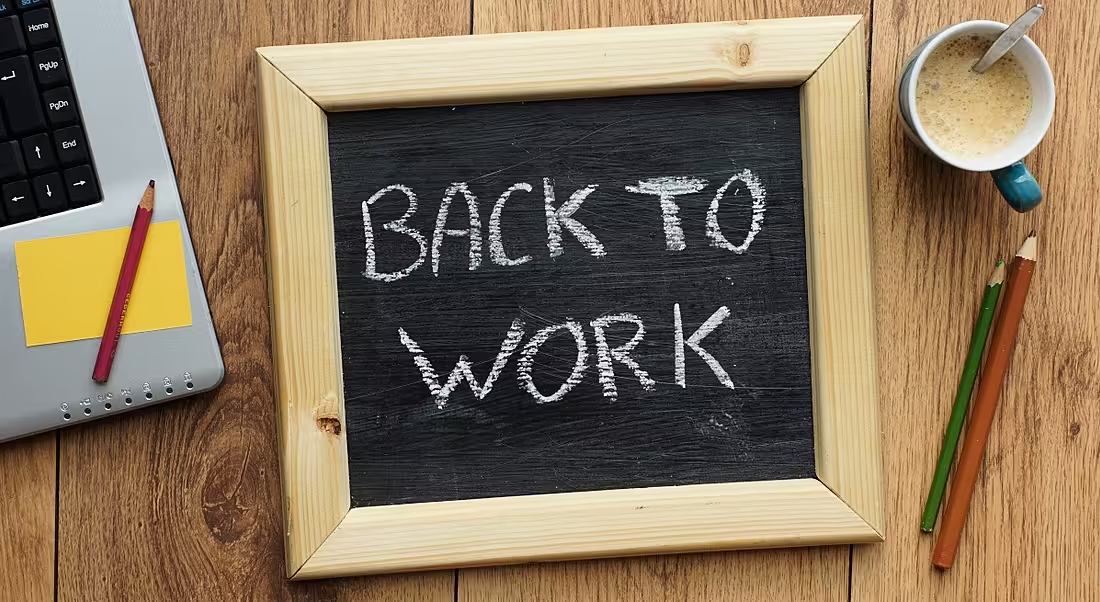Getting back into the swing of things at work after a holiday period can be difficult, but we’ve got you covered.
Regardless of how well you prepare in advance, returning to work after big holidays, such as Christmas and New Years, takes effort and for a few days afterwards there is always that slightly out of sync feeling. Standard tasks seem to require more energy and thought than they used to and you may even have become slightly rusty on core processes.
Additionally, in many countries, Ireland being a good example, the weather tends to be dark, stormy, wet and generally unpleasant, making it that much harder to get back into usual life, especially when you have to remove all of the bright decorations. So, with that in mind, how can employees work through the post-Christmas blues, to have a happy, healthy and productive start to the new year?
Make it manageable
While you can’t control the number of emails or tasks awaiting you in your first week back to work, you can make the flow of work more manageable. It can be tempting to tackle absolutely everything you missed while you were away, just to put a dent in it and see some progress, however, this is neither feasible nor sustainable.
Simply put, regardless of how the person on the other end feels, not everything that comes across your desk is going to be a priority, but by assessing what actually is you can better manage your workflow and deal with the most important tasks first. By laying out your work in order of priority and spreading tasks throughout the week you can avoid over-burdening yourself or becoming overwhelmed.
A good rule of thumb in the first couple of weeks back to work, and indeed for the entire year, is to always keep your workload manageable. Of course be prompt, organised and hardworking, but also cognisant of your own boundaries and what is reasonable in terms of employer, co-worker and stakeholder expectations.
Keep it social
If you had a busy Christmas and New Years, or even a quiet peaceful break, coming back from a period of celebration, activity or rest, into a steadier, more formal environment, can be jarring, leading to negative feelings, such as depression.
While the exact science behind post-holiday blues is disputed, research suggests that it is linked to heightened instances of adrenaline and the disruption to regular life, ultimately causing a dip in your mood when you go back to ‘ordinary’ day-to-day living.
For this reason it can be helpful to make time to socialise upon your return to work. This could be in the form of a quick chat with colleagues about their own Christmas, a shared lunchtime or even afterwork dinner or drinks. Coming out of any period of intense activity is going to throw you off, so why not ease out if it gently.
Champion yourself
Often it is the mundanity of returning to an orderly schedule that results in the post-Christmas blues. Not necessarily because you may not enjoy your job, but because it is only human nature to work towards fun, new and exciting things. As a species we thrive on change and advancement.
While you are getting back into the swing of things at work, why not set yourself some goals to aspire to. It doesn’t have to be anything major, for example a promotion, new career or third-level degree. It can literally be anything you would like to see yourself achieve within the year.
This could be to build upon workplace friendships, learn a new skill, accept more work-based responsibilities, become more involved in working culture or the local community, the list goes on and on. As long as it is a target that you aspire to and it sparks joy and excitement, you can’t go wrong.
Maintenance for body and soul
Ironically, if you are suffering from the post-Christmas blues because you find it difficult returning to work after a break, the establishment of a routine may actually help you. By getting up on time and carrying out your usual morning behaviours, getting dressed, brushing your hair, you let your brain get used to the idea of a set schedule again.
Not only that, but self-care, whether that is taking a walk, preparing a nice breakfast, or choosing an outfit that gives you confidence, can put a pep in your step and help prepare you for the days and weeks ahead. It’s important to look after your mental wellbeing as well as your physical health, which means lots of water, sleep, good food and activities that bring happiness.
Ultimately, it is only natural that our brains rewire themselves during periods of respite, as they become used to new routines. It takes work to undo those processes and even more work to reestablish what was there before, so don’t let it get you down. It shouldn’t last very long. But if it does, be sure to loop in your employer regarding additional support, as knowing when an issue is becoming a real problem is the first step in solving it. You’ve got this.
Don’t miss out on the knowledge you need to succeed. Sign up for the Daily Brief, Silicon Republic’s digest of need-to-know sci-tech news.




